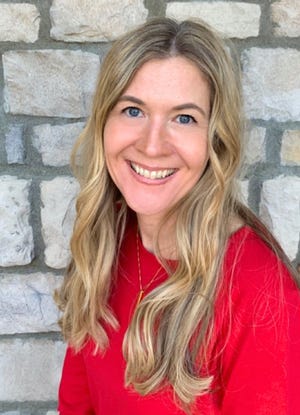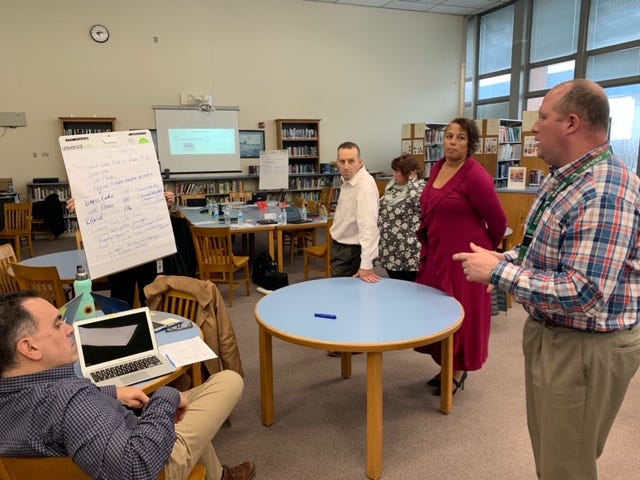$100,000 Grant to Help VUHS School Culture

VUHS SPECIAL EDUCATOR Becky Ebel has been awarded a $100,000 Rowland Scholarship, which she plans to use with the support of colleagues and students to help improve the school’s restorative justice practices, the voice students and general culture.
Independent Photo/Andy Kirkaldy
VERGENNES — Becky Ebel, a special education teacher at Vergennes Union High School, has received a $100,000 grant to foster a safe and inclusive school culture.
She will work with colleagues and students on a three-pronged project that aims to make restorative justice a centerpiece of the VUHS disciplinary system, make student voices in school matters stronger and more sustainable, and foster better communication. more respectful and productive, especially around sensitive issues.
The grant comes from the Rowland Foundation, a nonprofit now based in Burlington dedicated to improving education in Vermont schools. In early March, the foundation announced that Ebel, who is also a member of the VUHS leadership team, would be one of its five 2022 Rowland Fellows.
This decision awarded Ebel and the school $100,000 to pursue its proposal to strengthen these existing elements at VUHS.
Ebel, a 40-year-old 1999 VUHS graduate, will use the scholarship to take a year off and study how to improve school culture, including visiting schools in Vermont and beyond. VUHS may fund their position at no cost to the district.
“Finding out what works in other schools will be a big part of what we’re going to look at,” Ebel said. “The Rowland Fellowship is the gift of time for a teacher and for a school system to have someone able to dedicate a full year to research and help promote and create something that the school is invested in. .”
Ebel said she would not have pursued the scholarship without the support of staff and students.
“I would say the support is overwhelming,” she said. “I can’t think of a person who hasn’t said it’s important.”
Her scholarship proposal includes a few sentences that describe her goals.
“The goal of this project is to cultivate a safe and inclusive school culture,” Ebel wrote. “The critical work of this project will help us move beyond lofty statements or artificial structures and into creating real systems that work for us on a daily basis and as deep and permanent cultural change.”
Ebel is the fourth VUHS Rowland Fellow. Matt DeBlois, now principal of Vergennes Union Elementary School, helped create the VUHS advisory system which includes morning meetings; Kristine Kirkaldy, world language teacher, advanced skills-based education; and Michael Thomas, professor of social studies, has worked to establish interdisciplinary, project-based courses.
VUHS has received more Rowland scholarships than any other school. Ebel said that says a lot about his workplace.
“It indicates that we are interested in pursuing things in education that are truly student-centred, because the primary goal of The Rowland Foundation is that there is a positive impact for students,” he said. she stated.
These students want their voices to be heard and restorative justice to be enhanced, Ebel said, adding that what adults are hearing is that students “would like a more clear and formalized structure of how their leadership exists at the within the school and how they provide feedback to the administration. ”
MAKE IT WORK
Several elements are critical to the success of his project, Ebel said. The first is that the student structure must be sustained over the years, not just exist through a motivated cohort – hence the research into how other schools allow students to participate.
Others are staff adherence to respectful standards of communication and behavior and more training for staff and students on restorative justice, once more research has been done.
“It means that the professional development, the professional conversations that teachers have are also modeled in this restorative structure, that we are aware of how we organize our meetings and think about the systems that we have to engage with if we are not agree on something or have to bring up a difficult topic,” Ebel said.
Typically, in restorative justice, Ebel said, a student who was harmed by another student and the student who caused that harm would gather in a circle with other students and staff. All would be trained in the principles of restorative justice to “engage productively”. Both parties would have people to support them in the process.
Advance counseling would learn what the offended student hoped to accomplish, such as an apology or a statement that the offending student understood the harm caused. It would also be discussed in advance what the offending student was willing to acknowledge or concede.
“There’s a whole system that has to exist to get to this place,” Ebel said. “And that doesn’t mean that other, what would be considered traditional school discipline procedures, couldn’t still exist at the same time.”
Ebel’s proposal also speaks to “how racism, homophobia and prejudice affect our school, both individually and systemically,” particularly in the wake of the COVID-19 pandemic. She said a greater focus on appropriate standards of communication and behavior can help all parties discuss these issues with less conflict.
“It felt like we needed to talk about these things in a community together, even though people have different viewpoints,” she said. “That seems even more important as we look to move forward.”
CONTEXT
Ebel seems qualified to see multiple points of view. She comes from a family of educators – her mother was a longtime VUES teacher and her father a principal in the South Burlington district.
The environmental studies major at the University of Vermont found her true calling after being recruited to become a teaching assistant.
“That’s when I realized I really loved teaching,” Ebel said.
After graduating, she joined the AmeriCorps Vista program, spending two years with Project Walden, VUHS’ alternative education program. Then came two years in Arizona, where she earned teaching degrees at Northern Arizona University, planning to teach English. Instead, she taught science at Walden for eight years.
Then came the move into special education, where she now co-teach English and science classes, work one-on-one on reading and literacy with students on Individual Education Plans, and support students.” regardless of their disability and increases their skills in this area. »
She also works with colleagues and students’ families to improve student progress and ensure that VUHS is doing what it can to meet their needs.
Ebel explained the change in his career.
“I’m really passionate about literacy, that all students graduate high school with functional literacy, and I have the most ability to impact that as a special education teacher” , she said.
LOOK AHEAD
As much trauma as COVID-19 has caused to the education system, Ebel said the pandemic has also given him hope that the system is capable of change after adapting to distance and hybrid learning.
“The pandemic has shown us that we can actually make big changes,” she said.
At the same time, Ebel said, “the social life of the students was completely disrupted,” by demands that separated them from their friends.
These changes, she said, challenged the “social reality for everyone to come back from the pandemic and adapt” and led to more difficulties in “the need to talk about difficult subjects like racism, sexism, ableism, homophobia”.
This difficulty led the VUHS community to think about how to better manage these discussions and conflicts, Ebel said, and led her to think about making her Rowland proposal.
“I wrote the proposal and I am taking the scholarship next year. But it’s really in partnership and in collaboration with the teachers and the students here. I took the momentum that people indicated they felt and wrote a proposal,” she said.
Ebel finds the prospect of meaningful change resulting from collegial efforts both exciting and hopeful.
“Three years from now, I’d like to see that we’ve continued to develop our practices,” Ebel said.
“I think it would be amazing to have students who are confident facilitators for our weekly circles and also for restorative justice…to have a really clear structure for student leadership and voice in our school…and members staff (who) are confident to facilitate circles and navigate difficult topics as they arise.






